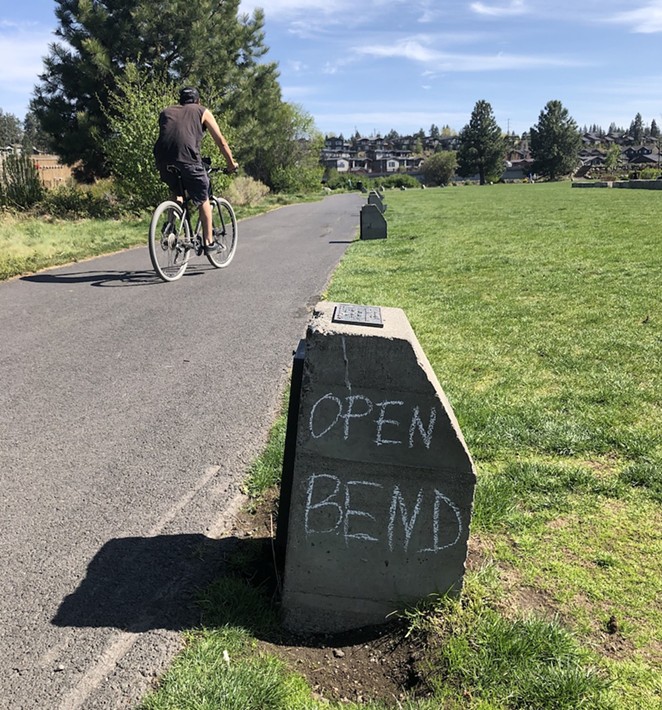Within the regions able to open, bars, restaurants, hair salons and gyms would be able to open their doors. Statewide, childcare services can operate by May 15, as well as some retail stores like malls and boutiques. Brown will release a separate set of guidelines for summer schools and camps.

Deschutes County commissioners approved their proposal for the governor at their board meeting on Wednesday, but the commissioners are still working out some kinks regarding contact tracing and shelter for people without homes. Counties are being asked to submit their plans to the governor by tomorrow for her review, before she decides which counties can indeed reopen May 15.
It is been two months since the Oregon Health Authority reported the first COVID-positive case in the state. Today, Oregon has the fourth-lowest COVID-19 infection rate in the U.S. and the eighth-lowest death rate, according to Oregon Health Authority Director Patrick Allen.
“Today, thanks to millions of Oregonians following the strict social distancing guidelines I put in place, I am happy to say that these sacrifices have prevented as many as 70,000 COVID-19 infections and 1,500 hospitalizations in Oregon,” said Gov. Kate Brown at a press conference on Thursday.Deschutes County is required to have 30 contact tracers ready to work before reopening, and it currently has only six.
tweet this
The State has finalized a testing and contact tracing strategy and is moving quickly to support counties in their efforts to create a robust system to isolate and track new cases. Deschutes County is required to have 30 contact tracers ready to work before reopening, and it currently has only six. The goal is to contact 90% of the people that an infected person has come into contact with, within 24 hours of their diagnosis.
“As we reopen parts of our economy, we know and expect that there may be an uptick in new coronavirus cases,” Brown said.
Even with the gentle phase-in for restaurants, yoga studios and small social gatherings, life in Oregon will not be returning to normal. Physical distancing, constant hand washing, and face masks are the new reality Oregonians will live with until a vaccine is publicly available, Brown said.
Rural counties first?
Some counties will qualify to enter phase one reopening by May 15, but the counties must have a plan and meet certain prerequisites before the governor will grant approval. The counties that have the best shot at reopening are those with a rural population and a small number of reported cases.
Deschutes County is something of a borderland—the classic urban-rural divide— lying at the gateway to a number of eastern counties, where there are few to no COVID-19 cases. Yet Deschutes County itself has the sixth-highest number (81, as of Thursday) of cases in the state.

Deschutes County has been designated as part of Region Seven by the Oregon Health Authority along with Jefferson, Crook, Klamath and Lake counties. The OHA said Wednesday that this region has met some initial metrics for reopening such as a decline in cases and increased testing capacity.
Thursday’s press conference was the first time Brown released the final details of phase one to the public, though county commissioners have been reviewing the draft for weeks to prepare their applications to re-open.
Phase one business guidelines will require strict safety precautions: staff will be required to wear face masks, sanitize the workplace, enforce physical distancing and limit the number of people allowed inside at one time.
tweet this
Phase one business guidelines will require strict safety precautions: staff will be required to wear face masks, sanitize the workplace, enforce physical distancing and limit the number of people allowed inside at one time.
Counties will be required to remain in the first phase for 21 days; then, counties can progress to fewer restrictions if there is no significant uptick in new COVID-19 cases. Gov. Brown has not confirmed the details of the next phase but drafts suggest phase two could include gatherings of up to 100 people, more businesses reopening, work in office settings and some visitation at facilities like nursing homes.
The final phase will open large events—but it is unlikely that any part of the state will enter this phase until a vaccine is available. Brown ordered the cancellation of all public gatherings such as concerts, festivals, sports events and conventions through the end of September.
Even for the businesses that can reopen in the coming weeks, the operating requirements may present a challenge. Restaurants must ensure that parties dining inside remain 6 feet apart. People operating barbershops and spas will be required to screen their clients over the phone for symptoms of COVID-19. The state will also encourage (but not require) temperature checks before beginning the appointment.
Priorities of Deschutes County Commissioners
Deschutes County commissioners Patti Adair, Anthony DeBone and Phil Henderson want Gov. Brown to open all local businesses—not just the ones she’s already outlined for counties in phase one. Commissioner Adair said she wanted churches open as soon as possible because she considers them essential businesses.
The county is also required by Brown to establish a safe, semi-permanent sanctuary for people without homes to isolate if they get infected or if they are vulnerable to infection. The county qualifies for Federal Emergency Management Agency funds to rent a motel block for this purpose. NeighborImpact is currently negotiating a contract with a local motel and will eventually be charged with managing the facility and providing support to the people who need quarantine or isolation.
“If we need to put someone that is unhoused and COVID positive [in isolation], this provides us with an option to do that,” explained Nathan Garibay, the emergency manager for the county. “This is a requirement or a prerequisite under the governor’s reopening plan… So this allows us to also best serve members of our community and try to limit the spread of the infection.”
The county will be reimbursed for this expense by NeighborImpact, who will eventually get reimbursed from FEMA. But it order for this to work, the county has to be a willing partner and sign the order. This will also allow the county to share in the potential liability of serving people with COVID-19 in a privately owned hotel. The commissioners wanted to view the county's agreement with NeighborImpact.
The commissioners had declined to sign the order at the time of publication.






















